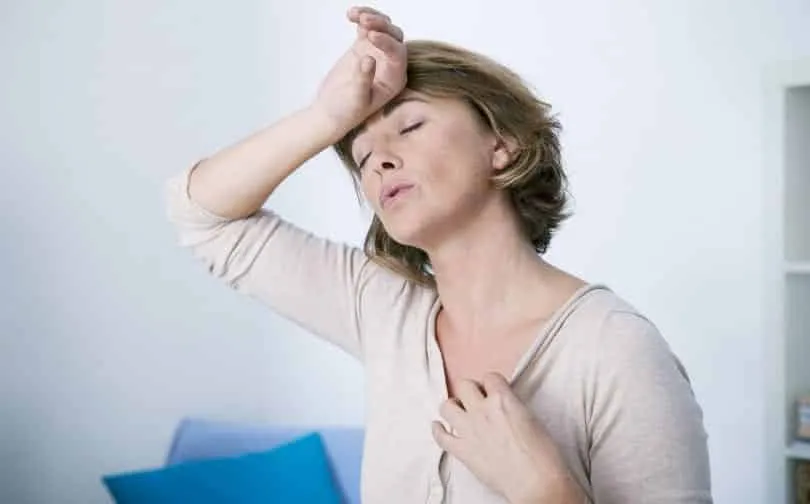Menopause symptoms are part of the natural female aging process and can appear between the ages of 45 and 55.
Menopause is a normal and natural part of female aging.
As you enter your 40s, your body will produce less and less estrogen until you no longer menstruate. Once you stop menstruating and have not had a period for 12 months, you have reached menopause.
Natural menopause, which happens without medical intervention, occurs in three stages:
- perimenopause
- menopause
- post-menopause
Many people confuse menopause with perimenopause. Perimenopause is the stage when a woman begins the transition to menopause. Some common symptoms of the perimenopause phase include:
- hot flashes
- night sweat
- vaginal dryness
During perimenopause, your body starts producing less estrogen. This continues until the last year or two before menopause until your hormone levels drop rapidly.
Perimenopause can begin up to 10 years before menopause. It often starts in their 40s, but some women enter perimenopause in their 30s.
Doctors will determine that you have reached menopause when they find that you have not had a period for 12 consecutive months. After that, you will enter the postmenopausal stage.
If you have had your ovaries surgically removed, you will experience “sudden” menopause.

How long do symptoms last?
Perimenopause symptoms can last an average of four years. Symptoms associated with this phase will gradually decrease during menopause and postmenopause. Women who have gone a full year without menstruation are considered post-menopausal.
Hot flushes (hot flashes) can occur at any stage of the climacteric and are characterized as a sudden and intense sensation of heat on the skin, appearing mainly on the upper trunk, neck and face.
There is an increase in blood circulating in these regions, which causes redness of the skin, and there can often be an increase in sweat produced.
Some women may also experience palpitations and a feeling of fainting. However, the intensity of symptoms varies from woman to woman.
Researchers also found that black women and women of average weight experience hot flashes for a longer period of time than white women and women who are considered overweight.
It is possible for a woman to go through menopause before the age of 55. Early menopause occurs in women who go through menopause before the age of 45. Premature menopause is considered if you are 40 years old or younger.
Early or premature menopause can happen for several reasons. Some women may experience early or premature menopause because of a surgical intervention, such as a hysterectomy. It can also happen if the ovaries are damaged by chemotherapy or other conditions and treatments.

Menopause symptoms
You will experience a range of symptoms during perimenopause (for example, your periods become irregular). The frequency, intensity, and duration of symptoms vary widely from person to person during perimenopause and as you approach it.
Once in menopause and postmenopause, symptoms may continue for an average of four to five years, but they decrease in frequency and intensity. Some women report that their symptoms lasted a little longer.
The most common symptoms include:
- Heat waves: This makes you feel a sudden rush of heat to your face and upper body. They can last from a few seconds to several minutes or longer. Hot flashes can occur several times a day or a few times a month.
- Night sweats: Hot flashes during sleep can result in night sweats. They can wake you up and make you feel more tired during the day.
- Cold Waves: You may experience chills, cold feet and goosebumps after your body cools down after a heat wave.
- Vaginal changes: Vaginal dryness, discomfort during sex, low libido and an urgent need to urinate are symptoms of genitourinary syndrome of menopause (GSM).
- Emotional changes: may include mild depression, mood changes and irritability.
- Sleeping problems: Sleep problems such as insomnia can occur due to night sweats.
Other symptoms may include:
- mastalgia
- worsening of premenstrual tension (PMS)
- dry skin, eyes, or mouth
Some women may also experience:
- headaches
- accelerated heart
- muscle and joint pain
- focus and memory problems
- hair loss
- weight gain
If you experience any of these additional symptoms, consult your doctor to rule out other causes.
You may experience any of these symptoms during menopause. But hot flashes often occur at the beginning of perimenopause.
Going through perimenopause and menopause can be uncomfortable and sometimes painful for many women. But it’s a normal and manageable part of aging.

When to seek help
It’s common and normal to experience irregular periods when you’re in perimenopause.
However, other conditions such as polycystic ovary syndrome or cervical cancer can also cause irregular bleeding. Consult your doctor to rule out other causes if you:
- suddenly experience very heavy periods or periods with blood clots
- have periods that last longer than usual
- bleeding after sex
- periods very close to each other
Osteoporosis and heart disease are long-term health risks associated with menopause. This is because estrogen plays an important role in protecting bones and the heart. Without estrogen, you are at a higher risk of this disease.
You also end up at an increased risk of urinary tract infections because menopause can make your urethra dry, irritated or inflamed.
Vaginal infections may also occur more frequently because your vagina has become drier and thinner.
Report menopause symptoms when visiting your doctor. Get re-evaluated by your doctor if you continue to have these intense menopause symptoms or if they last more than five years after your last menstrual period.
Ending balance
Life after menopause is not much different from life during the reproductive years. Remember to eat right, exercise and receive routine medical care, including dental and eye exams.
When and how long menopause symptoms last vary from woman to woman. It is common for these perimenopausal and postmenopausal symptoms to last around seven years.
A nutritious diet and regular exercise will help you keep your bones strong, while regular visits to the doctor will help you detect problems early.
Discover 8 natural ways to treat menopause symptoms!
Fonte: HealthLine

Sign up for our newsletter and stay up to date with exclusive news
that can transform your routine!
Warning: Undefined array key "title" in /home/storelat/public_html/wp-content/plugins/link-whisper-premium/templates/frontend/related-posts.php on line 12
Warning: Undefined array key "title_tag" in /home/storelat/public_html/wp-content/plugins/link-whisper-premium/templates/frontend/related-posts.php on line 13




